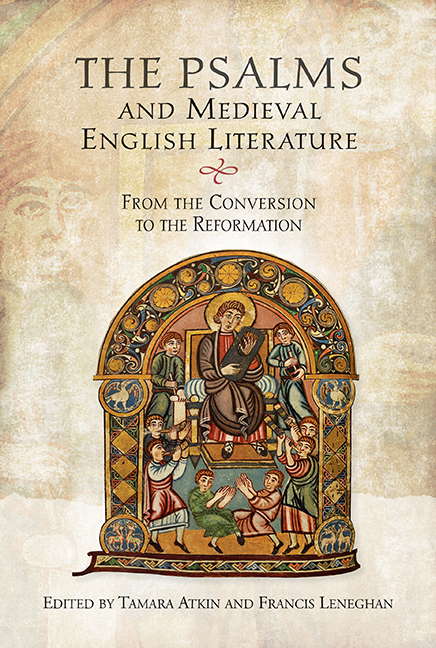Book contents
- Frontmatter
- Contents
- Figures
- Contributors
- Preface
- Acknowledgements
- Abbreviations
- Miscellaneous Frontmatter
- Introduction A Case Study of Psalm 50.13 in Old and Middle English
- I Translation
- II Adaptation
- III Voice
- 10 Maidstone's Psalms and the King's Speech
- 11 The Songs of the Threshold: Enargeia and the Psalter
- 12 Psalms as Public Interiorities: Eleanor Hull's Voices
- 13 Vox ecclesiae, vox Christi: the Psalms and Medieval English Ecclesiology
- Index
11 - The Songs of the Threshold: Enargeia and the Psalter
from III - Voice
Published online by Cambridge University Press: 09 May 2017
- Frontmatter
- Contents
- Figures
- Contributors
- Preface
- Acknowledgements
- Abbreviations
- Miscellaneous Frontmatter
- Introduction A Case Study of Psalm 50.13 in Old and Middle English
- I Translation
- II Adaptation
- III Voice
- 10 Maidstone's Psalms and the King's Speech
- 11 The Songs of the Threshold: Enargeia and the Psalter
- 12 Psalms as Public Interiorities: Eleanor Hull's Voices
- 13 Vox ecclesiae, vox Christi: the Psalms and Medieval English Ecclesiology
- Index
Summary
A poem is just a little machine for remembering itself; a poem makes a fetish of its memorability. It does this because the one unique thing about our art is that it can be carried in your head in its original state, intact and perfect. We merely recall a string quartet or a film or a painting — actually at a neurological level, we're only recalling a memory of it; but our memory of the poem is the poem itself. […] They are — and poems remain — invocatory forms. Prose evokes; the well-chosen word describes the thing. But poetry invokes; the memorable word conjures the subject from the air.
In one of his last completed poems, the 1527 Replication against Certain Young Scholars late Abjured, John Skelton claims for himself Davidic authority for the divine frenzy that urges him to argue against the misplaced motivation of the ‘frenetykes’, ‘lunatykes’, ‘sysmatykes’, ‘heretykes’ who have opposed him, citing Psalm 74.5: ‘dixi inique agentibus nolite inique agere et impiis nolite exaltare cornu’[‘I said to the wicked: Do not act wickedly: and to the sinners: Lift not up the horn’]. By preaching openly throughout East Anglia, Hertfordshire and London, the Lutherans Thomas Bilney and Thomas Arthur had lifted up the horn of heresy. Skelton felt impelled to reply, but in so doing found himself defending not only clerical orthodoxy and sound learning, but also his own calling as a poet. Skelton is defending himself against two main charges. The first invokes the assertion that poetry is not suitable for the treatment of high matters:
Ye saye that poetry
Maye nat flye so hye
In theology,
Nor analogy,
Nor philology,
Nor philosophy,
To answere or reply
Agaynst suche heresy. (11. 306–13)
The second is the older, ultimately Platonic, charge that poets are liars:
Why have ye than disdayne
At poetes, and complayne
Howe poetes do but fayne? (ll. 351–53)
Skelton's first line of defence is the argument from authority. He invokes St Jerome, ‘that doctour glorious’ (l. 319), whose Epistle 53 (Ad Paulinum: De studio Scripturarum), often prefixed to the Vulgate Bible and to the Glossa ordinaria in manuscript and in print, praises the poetry of David as comparable to that of the great classical lyric poets.
- Type
- Chapter
- Information
- The Psalms and Medieval English LiteratureFrom the Conversion to the Reformation, pp. 271 - 297Publisher: Boydell & BrewerPrint publication year: 2017

